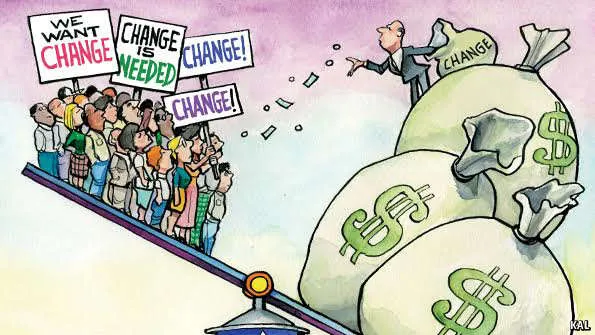The official narrative is clear. Some people earn much more than others and this wealth accumulates. Then given more wealth these people can make even more money and eventually the top 1% will control essentially everything. The only hope of redistributing and saving the poor is state authority and taxing the rich so they pay their part to society.
The only problem is that this story is wrong on many levels. In free markets being rich is not a recipe to make more money.
It isn't even today. The most important reason rich people are able to make a lot of money is that they can protect themselves from inflation. They conserve their wealth. This means an increase in $, but not in fractional buying power.
But the current political situation is actually very beneficial to the rich. Lets look at a simple example. Suppose there is an island with 100 non-violent people and a lot of coconut trees. One of them claims that he owns 99% of all coconuts and the remaining 99% own almost nothing and have to work to get food. The problem is that this one person does not have any magical superpowers and being the owner depends only on the belief of the others. If they revolt and just pick the nuts themselves its over. This means that the owner has to share some of the wealth to pay others to protect his coconut trees, or let the others also benefit from the trees in other ways. Game theory states that a symmetric situation where one person owns 99% and the rest only 1% is not possible on this island (and has never been the case anywhere on earth).
Owning property means that the owner has to pay the costs to protect the wealth. Owing wealth used privately means that these costs will be low since you have a direct connection to your property. But owning much more than you can directly control requires exponentially rising costs to protect the skewed resource distribution and gradually eats away the inequality.
The current system eliminates these cost for the rich by installing a publicly funded system of protecting property and enforcing law through state violence. In reality this benefits almost only the very rich. It is not in my interest to protect the property of other people, it is in my interest to protect my own property.
As a consequence we see that in our current economic model, for the first time in human history, we have a situation where 1% controls more than 50% of all wealth globally and the top three individuals in the U.S own as much as the bottom 50%. Because we all believe that it is our shared duty to protect the property of the rich.
Now I am not advocating Robin Hood style actions. In free markets there is a civilised way of doing things. Just let people pay for their own security (for example via property insurances) and not outsource their risks. Controlling a huge empire without relying on force via the government suddenly becomes extremely expensive.
People that own much (or their insurers) will find that it is maybe more efficient to pay into social systems than pay for guards (just as the states have realised even though they still claim a monopoly on violence). But in any case, opposing to the mainstream view, it is not the state that has to prevent a huge concentration of wealth, it is the state that enables it.
